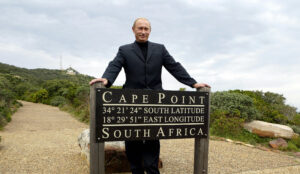It is hard to tell when a crisis in a dictatorial regime, such as the sudden breakdown of China’s economic model, is not about this or that, but about the regime itself. My own experience in this regard is very discouraging. In 1984, my book Grand Strategy of the Soviet Union contained many pages about nationalities I claimed were heading towards independence — not just the well-known if still very obedient Baltics, Armenians and Georgians, but others occupying vastly larger territories, the then barely known Kazakhs, Uzbeks, Kyrgyz, Tajik and Turkmen (I readily confess that it never occurred to me that Ukrainians might join them).
The response of every established Western Sovietologist was that I had foolishly confused folkloric categories with actual living and breathing nations — they were just “Soviets” who occasionally wore funny hats, and it was pure and utter fantasy that they might ever want to be independent. That was just seven years before the final and official collapse of the Soviet Union.
It is axiomatic that nations endure while regimes must collapse, but none of the easy Soviet analogies works when it comes to China. Yes, Beijing recognises 55 minority populations, but they account for no more than 9% or so of the total, and some of the nationalities really are only folkloric, unlike the Uyghur, Kazakhs and Tibetans whom the Chinese must actively repress.
As to the economy, it only broke the morale of the Soviet Communist Party after two decades of increasingly demoralising stagnation that had become obvious by 1980 even to casual visitors, who noticed a very distinctive no-hope “Soviet” look on most people’s faces. The Chinese Communist Party, by contrast, emerged from a visibly malnourished and downright dirty state — when I lived there in 1976, human waste was carted through its streets — with tentative growth from the early Eighties accelerating from the Nineties, gloriously enriching China until very recently.
Even today’s bad economic news reveals no terminal, necessarily regime-destroying diseases, as was true of the Soviet Union, which had to import wheat every few years even as it built more tractors for its farmers than the US. In China, in fact, the only wealth-destroying disease has been the very thing that every tourist and even some experts have admired immensely: the proliferation of a hugely impressive, mostly well-designed and well-built infrastructure, from high-speed trains that now reach even into Laos while connecting some 550 cities in 33 provinces, to the motorways that link every part of China, some all the way up mountains and into deserts, to the roughly 250 full-service airports (in 1976 only eight had enough runway for our small Trident jet), to the immense ports which imported 95 million metric tons of soya beans alone in 2021, when the Port of London handled 50 million tons of everything.
How do wonderful infrastructures destroy wealth? One example is sufficient. In 2018, on a drive along the North Korea border, I encountered a vast and beautiful white six-lane highway suspension bridge across the Yalu river. It was built to connect the Chinese city of Dandong with North Korea, to service the trade boom Xi expected with the promised opening of the North’s economy. Naturally, it would require a customs house, duly built as a very impressive high-rise, warehouses and more than 10 blocks of commercial offices. Yet when I visited, the bridge ended in a North Korean potato field, traffic was exactly zero, the customs house was empty and so were the office blocks and warehouses, some paid for by private border merchants who were bankrupt when I met them in Dandong (they openly cursed Xi for going along with the US-sponsored Security Council Embargo).
Savings that could have enriched many Chinese citizens, including the 180 million officially counted as “very poor” and the further 300 million or so still trapped in poverty, were instead wasted on the Yalu bridge complex, with uncountably greater waste on infrastructure all across China. The list starts with a least 100 grossly under-utilised airports and the many highways that are mostly empty of traffic even in crowded China, including the wonderful multi-lane G-214 that runs all the way from the near-tropical tourist town of Dali in Yunnan up the ever-rising landscape to Tibet.
The immediate issue now is not what might have been, had the capital been used to reduce poverty, but the way the money was found in the first place. Some was collected from taxes, but much more was found by adding to the immense debt mountain that now paralyses the investments of the private building firms that built skyscrapers and gigantic apartment blocks all over China, as well as the uniquely Chinese semi-private municipal and provincial joint ventures that built factories and infrastructural projects. The latter’s money came from the loans of the local branches of state banks, whose managers could not just say no to local party bosses, who could choose to invite them to sumptuous dinners in pretty company or to lock them up for corruption investigations as they saw fit. Back in Beijing, senior managers at Bank of China headquarters — whose role models are neither Mao, Lenin nor even Xi Jinping, but rather their Bank of England and Federal Reserve counterparts with whom many have studied in the US and England — kept trying to discipline the flood of bank loans to the chronically overambitious joint-venture companies. But they had no power at all to scare off the party bosses.
Pan Gongsheng, the current Bank chief, is certainly the most independent official surviving in Xi’s intensely autocratic China, just as the head of the Russian central bank, Elvira Näbiullina, is the most independent official in Moscow. Yet Pan knows he cannot stop the infrastructure projects that are daily adding to China’s debt mountain, without immediately replacing a debt crisis with a mass unemployment crisis — any more than Näbiullina can stop the Ukraine war, whose dead and wounded are much less of a threat for her than the ultimate horror of war-spending inflation (which in Russia can quickly starve 44 million pensioners).
The sudden economic crisis that has stalled China’s economy after decades of growth is very obviously not just “cyclical”. Xi Jinping cannot afford to just sit it out: the immense debt mountain must be reduced to resume profitable investments. In the US, the cure for the 2007-2009 debt crisis that stalled Europe’s economy as well, was the 2008 bankruptcy of literally high-flying Lehman Brothers (its 20-somethings in different offices in the same Manhattan building sent notes to each other by Federal Express via Memphis, Tennessee), and of hundreds of other high-fliers large and small. As for the millions of US homeowners with unpayable mortgages, they just walked out, becoming instantly homeless but also debt-free. Yet very few remained homeless because the US economy picked up very quickly once it was drastically purged of non-repayable loans. (Japan’s housing collapse, on the other hand, stopped the economy for a decade because home loans were personal and could not just be abandoned)
In China, the problem is the opposite: uncounted millions have all or much of their savings in apartments that stand empty, generating tax and other costs instead of income, and they cannot just walk out of them. They need renters, who in practice must be mostly young couples setting up families, especially today, when many young and not-so young single Chinese are stuck living with their parents. It is at this exact point that an economic problem becomes a political one, which can be lethal to any regime, even Xi Jinping’s constantly self-praising and seemingly formidable autocracy.
The first political blip did not originate in ancient China nor even in post-1949 Communist China — it only dates back to July 2023. It was then that the authorities stopped publishing the 16-to-24 unemployment statistic that reached 21.3% in June, a number both very high and also a gross underestimate by all accounts. What makes this unemployment potentially explosive is not the fact that June unemployment was actually much higher than 21.3% (expert estimates start at 30%), nor even the fact that the July percentage was not published because it was even higher, but rather Xi Jinping’s very personal responsibility for much of it.
It was Xi alone, in an expressly personal decision in the name of social equality, who abruptly shut down China’s vast private tutoring industry in July 2021, depriving new university graduates of desirable starter jobs; the seven largest teaching companies alone had to fire 250,000 graduates. Enterprising graduates tried to teach privately, but in October 2021 online tutoring was halted, while those who gathered a few pupils for lessons in parks of cafes were told to stop or face arrest when spotted by police.
Also very much Xi Jinping’s personal responsibility was the abrupt collapse in the demand for new graduates in the entire high-tech sector, which followed the disappearance of China’s most dynamic entrepreneur Alibaba’s founder Jack Ma. Dictators are well known for their jealousy. And the spectacle of Ma being serenaded by more than 25,000 utterly ecstatic Alibaba employees on his birthday (he himself was singing and playing the guitar) was just too much for Xi, who only receives a dutiful clapping from his corralled party underlings.
In November 2020, Ma was summoned to a Party office for having dared to question a lesser official’s remarks. A few days later, the record-breaking $34 billion stock-market listing of his new Ant Group, which was set to hire tens of thousands, was abruptly stopped, as was Ma himself, who disappeared for three months until he was trotted back out in humiliating circumstances. Then, instead of hiring 20,000 new graduates as it did in 2020, Alibaba had to fire 20,000 in 2021, while many other jobs were suppressed by other Chinese high-tech companies whose chiefs cancelled new projects to avoid attention.
Many in China also know that Xi is personally responsible for the spread of anti-Chinese attitudes around the world, which, in turn, has greatly reduced investment, affected employment, and made Chinese tourists and students feel unwelcome in many countries. And the educated know that it was Xi personally who promoted the “wolf warrior” diplomats who openly upbraided and even insulted the governments to which they were accredited, earning headlines in China and the contempt of the locals for all things Chinese. And it is widely understood that Xi has gone out of his way to encourage Chinese soldiers, sailors and pilots to act aggressively, causing incidents with India, Indonesia, Japan, the Philippines and Vietnam, as well as US ships and aircraft. (Xi made Colonel Qi Fabao, who was filmed inciting the 2020 Galwan incident that killed 30 Indian and four Chinese troops, a delegate to the Party Congress, China’s equivalent to the House of Lords.)
With China in deep trouble, and finding himself in the cross hairs of any party boss who dreams of evading his “anti-corruption” goons long enough to oust him, might Xi be tempted to invade Taiwan to divert attention? The belief that leaders start wars to divert attention is common among cotton-wool-between-the-ears intellectuals, and in Hollywood it is gospel, but the real thing is very rare. Even the theory that General Leopoldo Galtieri invaded the Falklands in 1982 to divert attention from Argentina’s perpetually bad economy and the Junta’s torture chambers is rather shaky. For one thing, Britain’s Foreign Secretary Lord Carrington resigned to take responsibility for mixed messages that might have encouraged the Argentines instead of deterring them.
In any case, Xi’s talk of war — which is all about the “rejuvenation” of Chinese manhood, and the impellent necessity to redeem a very long history of defeats (the last in Vietnam in 1979) by winning a war, any war — started when China’s economy was still in splendid shape. If anything, it is the conflict in Ukraine that might encourage Xi to invade Taiwan, because it proves that wars can be fought without a nuclear Armageddon, and with many other limits too (a Russian will soon ascend to the International Space Station from Cape Canaveral). Not even the collapse of Putin’s quick-victory plan might dissuade Xi, who will rely on treason within Taiwan’s astonishingly lackadaisical armed forces to win quickly. Last year, Taiwan reacted to sharply risen tensions by increasing military service to a measly one year from an absurd four months — and then delayed the start to 2024…
In the meantime, the entire world will pay a price for China’s economic downturn because it accounts for such a big slice of the world economic pie, though with a very welcome consolation prize: for the first time since 1949, it is possible to imagine a post-Communist China.
When, in November 2022, hundreds of Foxconn factory workers ignored police orders as they spilled out of the giant plant in Zhengzhou because they did not want to be trapped by a Covid lockdown, and then actually attacked the policemen who tried to stop them, Xi did not order machine-gun fire. Instead, he capitulated unconditionally, abruptly stopping all Covid restrictions everywhere — leaving the Party’s authority in tatters. China has been in a state of post-traumatic stress ever since, now with rising bitterness for the lost jobs of youth and the lost savings of the old. Xi has created a world defined by interesting times, in which it is possible to imagine both a Taiwan war and a post-Communist China.
Disclaimer
Some of the posts we share are controversial and we do not necessarily agree with them in the whole extend. Sometimes we agree with the content or part of it but we do not agree with the narration or language. Nevertheless we find them somehow interesting, valuable and/or informative or we share them, because we strongly believe in freedom of speech, free press and journalism. We strongly encourage you to have a critical approach to all the content, do your own research and analysis to build your own opinion.
We would be glad to have your feedback.
Source: UnHerd Read the original article here: https://unherd.com/




